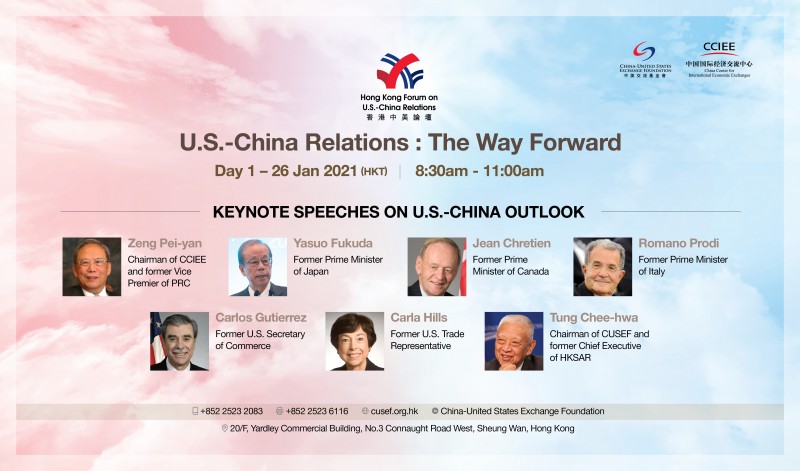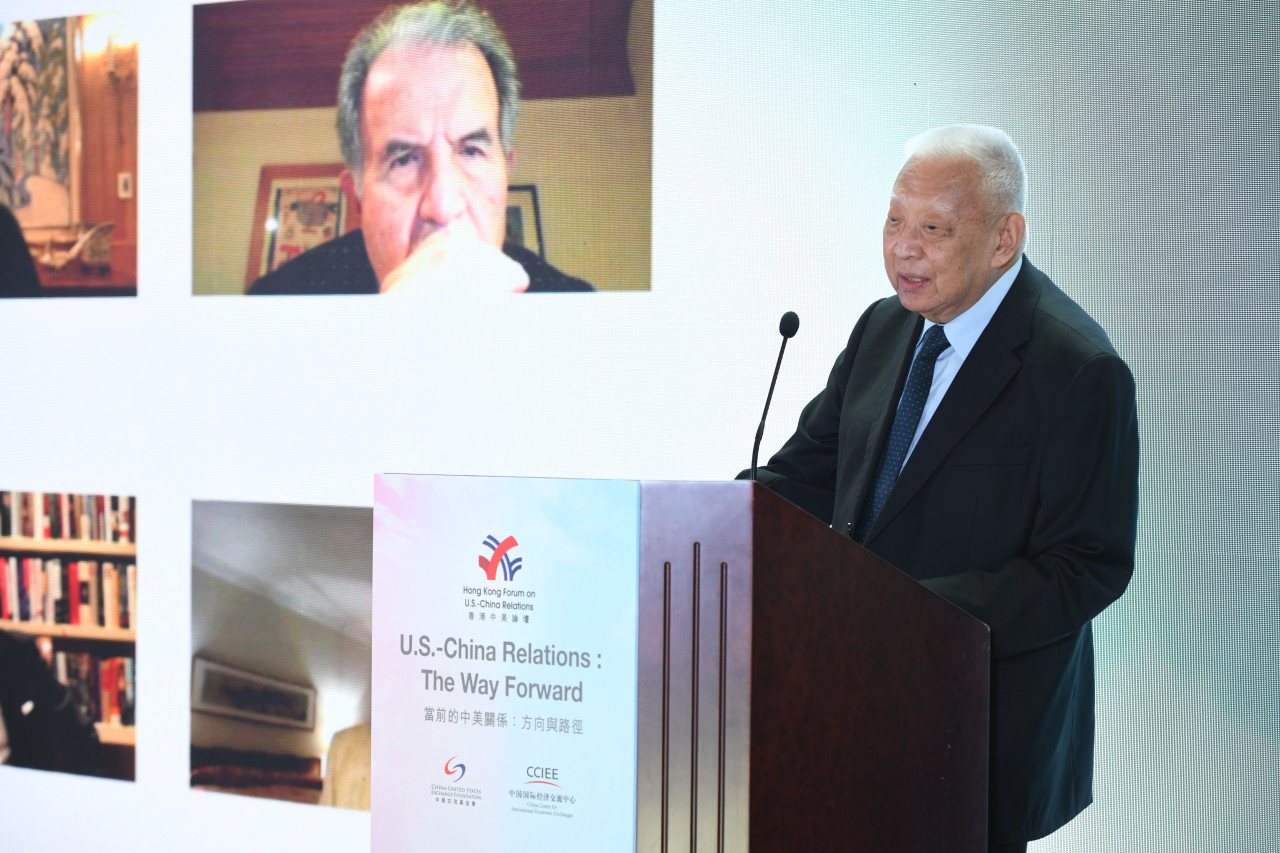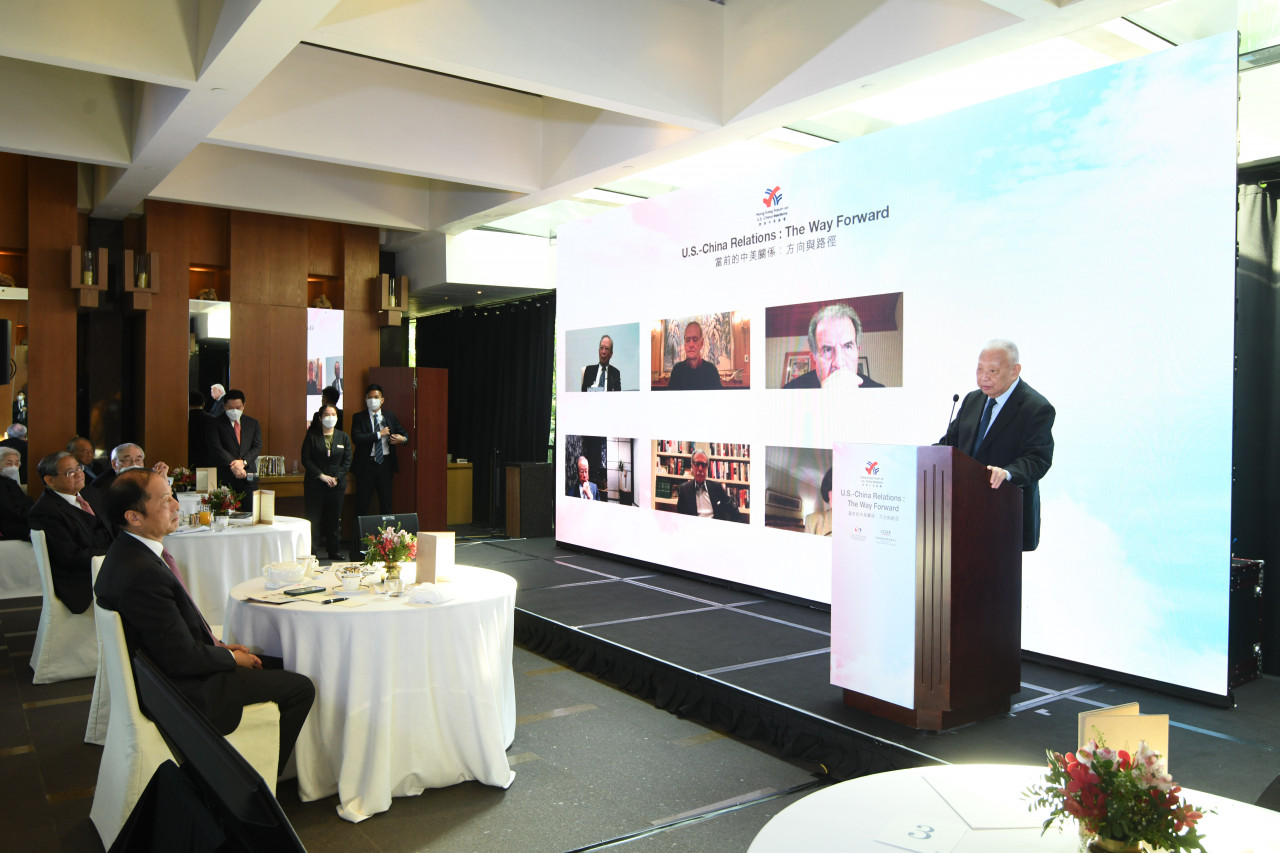At a pivotal point in China-US relations, in the midst of COVID-19, and days following the inauguration of President Joe Biden, the United States and China are facing profound changes in their relationship and must work to bring stability back to the world community of which these nations are two of its most important members, agreed panelists in a session during the "US-China Relations: The Way Forward" forum hosted by the China-U.S. Exchange Foundation (CUSEF) and the China Center for International Economic Exchanges (CCIEE) on January 26, 2021.
Over 40 past and current major stakeholders and influencers in the China-U.S. relationship including, former Prime Minister of Japan Yasuo Fukuda, CCIEE Chairman and former PRC Vice Premier Zeng Peiyan, former Prime Minister of Italy and former President of the European Commission Romano Prodi, former U.S. Secretary of Commerce Carlos Gutierrez, CPPCC Vice Chairman Tung Chee-hwa, current government officials, senior business leaders and renowned scholars from the United States, China, and other Asia Pacific countries came together virtually in an effort to address the current challenges facing bilateral relations. The discussion focused on how China and the U.S. should move forward in light of the incoming U.S. administration and use the opportunity to identify areas of cooperation between the two countries to tackle global challenges including climate change, the environment, food security, cyber security and COVID-19.

In an opening greeting to the forum, Carrie Lam, Chief Executive of Hong Kong Special Administrative Region, stressed that, “with the incoming 46th President of the U.S. we hope that bilateral relations between the world’s two leading economies will start to improve, providing the impetus of global recovery.” Ms. Lam added that both President Xi Jinping and President Joe Biden echoed their commitment to international cooperation on important issues going forward, specifically in global efforts to eradicate the pandemic.
Adding to the optimism and hope for progress in both trade and policy negotiations between the U.S. and China, CCIEE Chairman Zeng Peiyan said that in order to seek win-win cooperation, China and the U.S. must first rebuild mutual trust by restarting and improving multi-level engagement mechanisms and ultimately, using that dialogue as the fundamental conduit to address issues and challenges in order to play a leading role in managing relations. He also stressed that the two countries must “reshape and restart economic and trade relations, which have always been the ballast and stabilizer of the overall relationship.”
In addition to this, global governance will be essential during an era of heightened risk. Speakers stressed their optimism of a new American president, but also spoke candidly of the challenges that will remain on both sides due to the innate political frames of both countries. “I don’t think there will be a major change between China and U.S. relations despite the new administration. However, there will be more dialogue,” said Romano Prodi, former Prime Minister of Italy and former President of the European Commission. “The tensions within the U.S. and competition with China are prevalent amongst both the Republicans and Democrats. Thus, there will be a necessity for deeper dialogue and exchange of views.”
Former Prime Minister of Japan Yasuo Fukuda stressed that less division and instability is something all nations are seeking given the risks and problems that need to be resolved immediately, which cannot be solved without the United States and its global leadership, especially in international trade and finance. However, he notes that “the U.S. must first contain the biggest issue – COVID-19, before it can help the rest of the world.”
Emphasizing the detrimental effects of a complete China-U.S. decoupling, former U.S. Secretary of Commerce Carlos Gutierrez firmly believes that this bilateral relationship should not be one based solely on transactions, but rather one that encourages a more strategic partnership, which increases areas of collaboration while eradicating areas of friction. “When you call someone an enemy, they become your enemy. We [U.S.] are not an enemy of China, and I don’t think China is an enemy of us. Words matter.” Former U.S. Trade Representative Carla Hills echoed this same sentiment by predicting that there will be significant changes in how the U.S. handles its international relationships. In her eyes, “the tone in which we deal with all international governments, including China, will be more diplomatic.”

In the closing remarks of today’s session, Tung Chee-hwa, the founder and Chairman of CUSEF, referenced both President Xi Jinping and President Biden in sharing their mutual goals to address global challenges including fighting climate change and COVID-19. He underscored that the world needs assurance that all nations will abide by the same rules-based system and that China will work to protect the rules-based system and maintain global harmony. Addressing areas of cooperation, Mr. Tung explained, “President Biden has said that his four priorities are the pandemic, the economy, climate change, and racial injustice. There is no question that the two countries can work together in at least the first three priorities.” In his opinion, “It is time to turn the page of the negatives of the past few years and start to work with one another again.”
Read more about our special report here.
